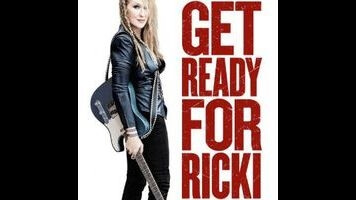Jonathan Demme gets back to his roots with Ricki And The Flash

Ricki Randazzo, the middle-aged heroine of Jonathan Demme’s minor domestic drama Ricki And The Flash, is the kind of person who would be described as “a character,” were she not already fictional. As the frontwoman of a bar band in Tarzana, California, she belts outs crowd-pleasing covers (“American Girl,” “Wooly Bully”) in between bad stage patter and anti-Obama rants. She favors block heels, ratty braids, and blue mascara, and has an ugly “Don’t Tread On Me” back tattoo. She lives in one of those San Fernando Valley apartment complexes that looks like a motel, and works check-out at a Whole Foods stand-in to make rent. As in Demme’s best early work (Handle With Care, Melvin & Howard), there is both an affection for a uniquely American type of oddball and a clear-eyed sense of their foibles.
At least part of the credit belongs to screenwriter Diablo Cody, who seems to have set out to write a greatest-hits Jonathan Demme movie—complete with full-length live musical numbers, kitsch décor, and a wedding—while taking another go at the basic premise of her script for Young Adult: the story of a nobody returning to nowhere. Summoned by ex-husband Pete (Kevin Kline), Ricki (Meryl Streep) returns to the sleepy Indiana suburb she fled decades ago to spend time with youngest child Julie (Mamie Gummer, Streep’s real-life daughter), who has just survived a suicide attempt. There’s long-standing tension between Ricki—real name Linda Brummel—and her three grown-up children, effectively raised by stepmother Maureen (Audra McDonald) after Ricki went West to pursue a dream and fail. But aside from Julie’s husband, who left her for another woman, there are no villains—only people so hung up on how they wanted their lives to turn out that they end up hurting those around them, sometimes subtly.
Given that Demme’s Stop Making Sense represents the high-water mark of the concert film as a genre, it should come as no surprise that Ricki And The Flash’s musical numbers—filmed live, with Streep singing and playing rhythm guitar—are uniformly superb. (Bernie Worrell, who played keyboards in Stop Making Sense, is one of several veteran musicians cast as Ricki’s backing band, The Flash; Rick Springfield plays her sweet, slightly dopey guitarist-slash-boyfriend.) But as in much of the prolific director’s later work, one can’t help but miss the creative contributions of Tak Fujimoto, the cinematographer of most of Demme’s best and best-known films, including Melvin & Howard, Something Wild, Silence Of The Lambs, and Beloved.
Fujimoto’s shadowy visual sensibility was a unifying factor, and without it, Ricki And The Flash—which was shot by Declan Quinn, Demme’s go-to cinematographer in recent years—swings wildly between different conventional camera styles, turning into a small-club concert doc for The Flash’s regular gigs at The Salt Well or into stagey, locked-down farce during the restaurant scene that introduces Ricki and Pete’s sons, Joshua (Sebastian Stan) and Adam (Nick Westrate). What keeps the movie together, instead, are some complicated serio-comic performances, especially from Kline and Streep, the latter for once seemingly out of her comfort zone as a self-styled free spirit whose Tea Party leanings set her liberal Midwestern family on edge.
Though best known for her arch dialogue, Cody has a knack for location, setting stories in sharply sketched places and clearly defined moments in characters’ lives—qualities that sometimes make Ricki And The Flash feel like a throwback to the minor-key American filmmaking of the 1970s, when Demme first arrived on the scene. The same ear for the super-specific that informs Cody’s pop culture references (see: Julie describing Ricki as looking like “a hooker from Night Court”) gives her an edge when it comes to questions of class, money, and race, even if the writing sometimes swings broad. Ricki And The Flash is a movie of things that may have been done better earlier—sometimes by Demme himself—but which are done all too rarely nowadays, which makes it feel both retro and refreshing.